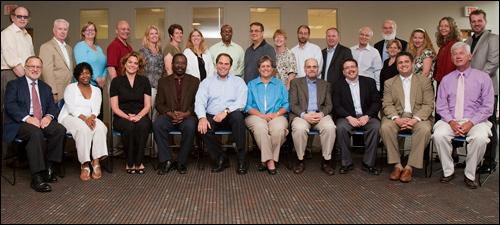Oxholm Begins Presidency With Senior Leadership Summits, Focus on ‘Team’

Looking relaxed after the three-day cross-country train ride that brought him east from Sacramento, Calif., President Carl (Tobey) Oxholm III spent most of his first full day on the Arcadia campus with the University’s senior administrative and academic leadership.
Coming together for the first time in his Presidency, and in anyone’s memory, were the deans, vice presidents, directors, other senior administrators, and their “number twos”—some 30 people strong—for a four-hour “team meeting.” At its conclusion, he went right into a leadership meeting with the Faculty Council, his second since being announced as President. He announced his intention to continue holding these meetings regularly once he arrives on campus full-time on Aug. 1.
Starting the day over breakfast with his Senior Leadership Team, President Oxholm expressed his joy at being given the opportunity to lead “such a wonderful university that has so many assets and so many great people who so clearly love students and learning.”
He confirmed that he is arriving at “an important time for Arcadia” because of the successful completion of the capital campaign, the newly academic restructuring into schools and colleges, and the high spirit that pervades the campus. He observed that Arcadia is blessed with highly talented faculty and staff but noted the necessity to get everyone on the same page so the University can maximize these talents.
He noted that in 2022, Arcadia will celebrate its 150th anniversary of achieving collegiate status. “That gives us the opportunity to envision where we want to be on that historic occasion.” To provide a constant reminder of this goal, his “first official act” was to change the President’s telephone extension to x2022.
He told his Senior Leadership Team that they would be working together in five areas that hold the keys to Arcadia’s future success, where he was looking for everyone’s “creative energy” and where there would be shared responsibility and accountability:
- How can we enhance the quality of our academic offerings, ensuring that the education we provide is cutting-edge in the fields that our students need to succeed in a quickly changing world, and giving them the ability to face new situations with confidence and the skills they will need to succeed: critical thinking, cultural sensitivity, technological savvy, and leadership in diverse groups?
- How can we re-engage our older alumni, especially our alumnae, who experienced and loved what now appears to them to be a very different college but in fact is, at is core, very much the same? And how can we engage the younger alumni, who will respond to different types of communication?
- How can we increase the attractiveness of our community to international students? And how can we bring the international experience to our campus, so that what we offer our American students is not just one episode “there” but continues and builds “here”?
- How can we become more inclusive of diversity and inner-city students, ensuring not only that students, faculty and staff of color feel welcome in Glenside, but that they establish connections, persist, and succeed?
- How can we create a more lively and engaging experience on campus, especially on weekends, that makes our campus a place where students, alumni, the community and guests want to be?
These will be the focus of leadership’s efforts over the coming months and years. “We will achieve success only if we are creative and entrepreneurial, if we let the community know what we are doing and invite them to share in our work, and if we here in this room work well together as a team.”
The Senior Leadership Team then heard individual leaders’ presentations on three critical issues facing their units over the next six months and engaged in discussions on those topics. The discussions were so energetic that the meeting ended before the agenda was completed; and the Team will meet again on Aug. 1.
President Oxholm also announced that his Cabinet and all senior executive meetings will be held in the Dining Hall—a visible change that reflects the openness and the proximity to students that will be hallmarks of his administration.

